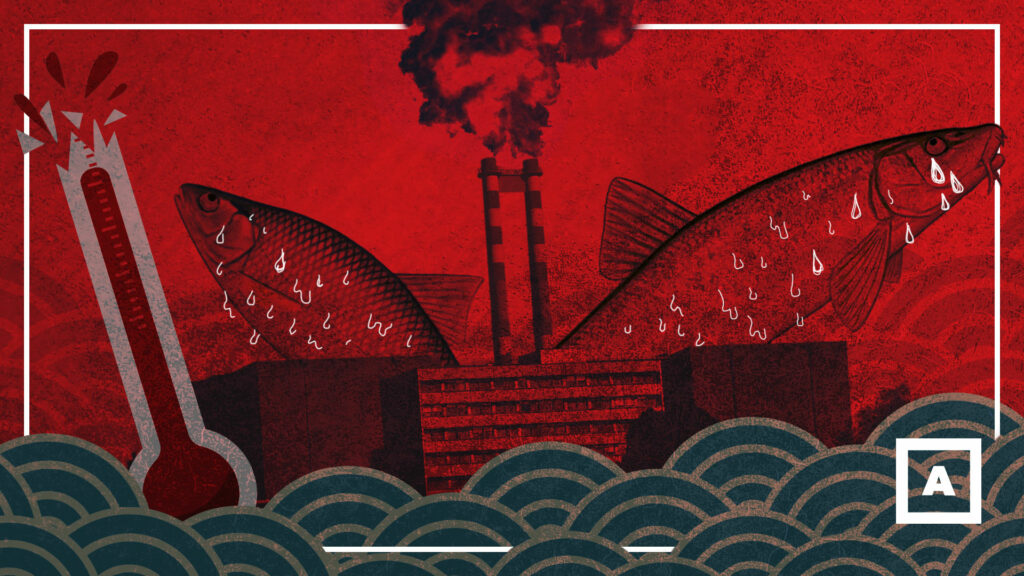The https://english.atlatszo.hu use cookies to track and profile customers such as action tags and pixel tracking on our website to assist our marketing. On our website we use technical, analytical, marketing and preference cookies. These are necessary for our site to work properly and to give us inforamation about how our site is used. See Cookies Policy
Environmental permit of Paks 2 threatened by Paks nuclear plant’s lifetime extension and the warming of the Danube
The environmental permit was the first of the “big” ones that Paks 2 obtained. During the procedure, the environmental protection authority examined the potential impact of the planned nuclear power plant’ construction and operation on the natural environment. In the eight years since the permit was issued, however, circumstances have changed to such an extent that the data and findings of the envirionmental impact assessment on which the permit was based are no longer correct. According to technical and legal experts consulted by Átlátszó, the permit should therefore be reviewed or withdrawn.
The environmental licensing procedure started in 2014, and was concluded in 2016. According to the environmental permit issued, the authority shall revoke the environmental permit if the conditions have changed substantially. The affected party, i.e. Paks II Zrt., is obliged to notify the environmental authority, i.e. the Government Office of Baranya County, within fifteen days of any significant change in the circumstances. Besides, the authority also investigates the change of circumstances ex officio and, if they find significant differences, order a review.

A significant difference is a change in circumstances or technology that results in a higher environmental impact than permitted. In the case of Paks 2, for example, the Parliament’s decision in December 2022 to extend the lifetime of the existing Paks NPP by 20 years can be considered a significant change. This way the existing nuclear power plant could still be in operation in 2057. However, the environmental impact assessment of Paks 2 only foresaw the parallel operation of Paks NPP and Paks II until 2037. This is a significant change, because contrary to the assumptions of the original impact assessment,
more than twice the current amount of hot water will flow into the Danube not just for a few years, but for decades.
The current amount of cooling water is already a growing problem, as the average temperature of the Danube is constantly rising due to climate change.
Although the Paks 2 impact assessment study did anticipate some warming of the Danube, the accuracy of the assumptions was already disputed at that time by e.g. Energiaklub, Greenpeace and Benedek Jávor (MEP). However, since then, facts have become available that show the values assumed in the impact assessment have been underestimated.
For example, at the request of the Baranya County Government Office, model calculations of hot water mixing had to be carried out, assuming low water flows (950 m³/s) and high Danube water temperatures (25.61 °C) at the same time. However, the authors of the study pointed out that “such a combination of water flow/water temperature is highly unlikely to occur (it has never occurred before, as confirmed by the measured data). It has an approximate probability of 1 in 100 000 years or more and a persistence of less than 0.1 day/year.”
However, just three years later, between 22-24 August 2018, the combination of water flows below 950 m³/s and water temperatures above 25.61 °C occurred and persisted for days. The same was repeated in the period 17-20 August 2022.
The study also claimed that “ the available time series on the Danube water flow and water temperature show that the maximum water temperature associated with a water flow of 950 m³/sec is 20 °C“. This also proved to be false: during the low-water period of 22-24 August 2018, Danube temperatures of 26°C and above were measured in Paks.
Assumptions about the rate of warming are also out of date: the impact assessment study assumed maximum Danube temperatures of 26.38°C for 2032. In reality, however, water temperatures above this level were measured at Paks already in 2018 for more than a week. Based on past warming rates, higher Danube temperatures are likely by 2032.
The authority does not seem to be very concerned about the issue
We submitted a freedom of information request to the Baranya County Government Office. According to their reply, neither Paks II Zrt. has notified the office of any significant changes in the above or any other circumstances since the environmental permit was issued, nor the authority had taken any initiative to review or to revoke the permit.
Thus, neither Paks II Zrt. nor the environmental protection authority considered the lifetime extension of the existing Paks nuclear power plant, nor the facts about the effects of climate change, nor the significant delay in the original construction schedule to be significant changes. However, technical and legal experts have told Átlátszó that these changes justify at least a review of the environmental permit.
Written and translated by Orsolya Fülöp. The Hungarian version of this story is here.

